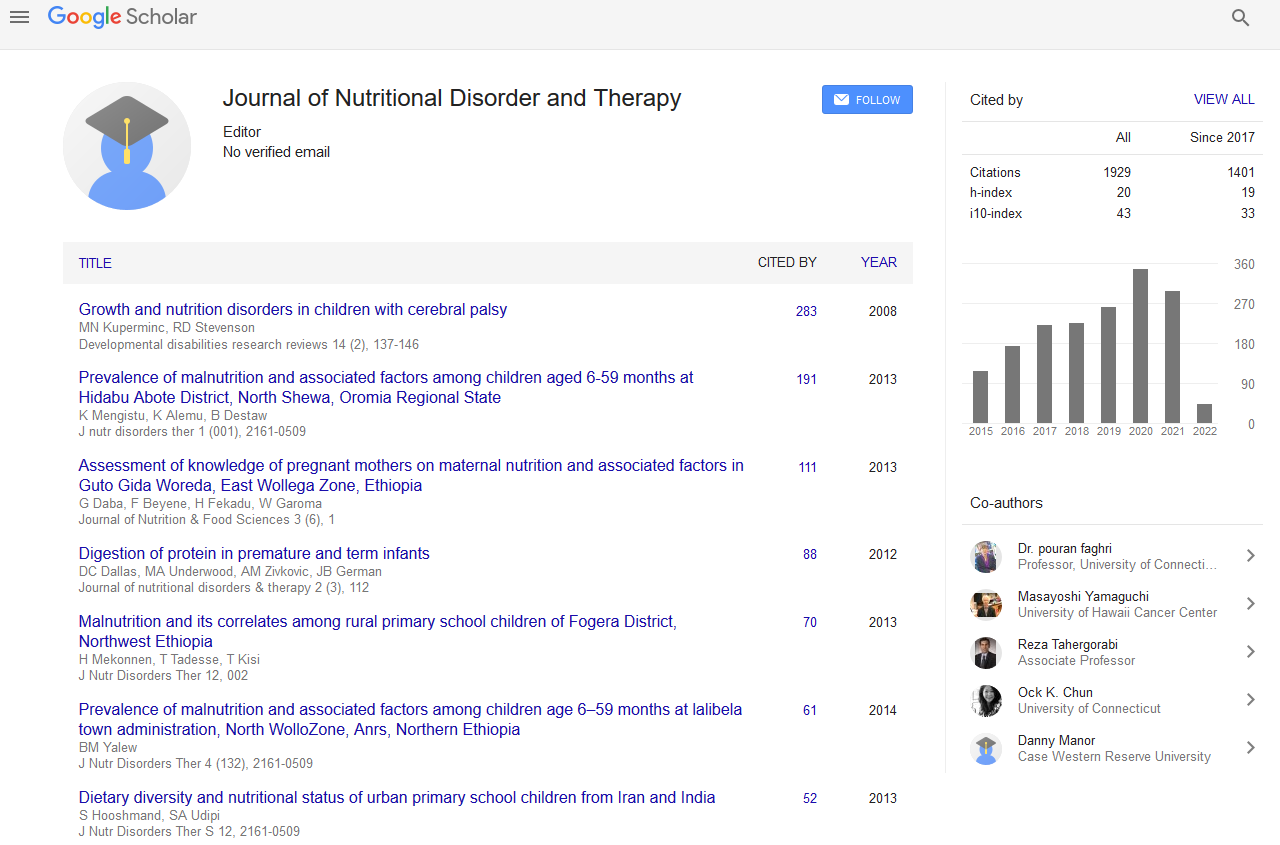Indexed In
- Open J Gate
- Genamics JournalSeek
- Academic Keys
- JournalTOCs
- Ulrich's Periodicals Directory
- RefSeek
- Hamdard University
- EBSCO A-Z
- OCLC- WorldCat
- Publons
- Geneva Foundation for Medical Education and Research
- Euro Pub
Useful Links
Share This Page
Journal Flyer

Open Access Journals
- Agri and Aquaculture
- Biochemistry
- Bioinformatics & Systems Biology
- Business & Management
- Chemistry
- Clinical Sciences
- Engineering
- Food & Nutrition
- General Science
- Genetics & Molecular Biology
- Immunology & Microbiology
- Medical Sciences
- Neuroscience & Psychology
- Nursing & Health Care
- Pharmaceutical Sciences
Metabolic responses in endothelial cells following exposure to ketone bodies
15th International Conference on Clinical Nutrition
May 24-26, 2018 | Vienna, Austria
Erika Meroni, Nadia Papini, Franca Criscuoli, Maria C Casiraghi, Luca Massaccesi, Nicoletta Basilico and Daniela Erba
University of Milan, Italy
Scientific Tracks Abstracts: J Nutr Disorders Ther
Abstract:
The Ketogenic Diet (KD) is a high-fat, low-carbohydrate diet based on the induction of the synthesis of Ketone Bodies (KB). Despite its multiple applications, the impact of KD on the human body is not completely understood. The purpose of this study was to evaluate in vitro the biological effects of KB on HMEC-1 endothelial cells. The exposure of cells to KB exerted a moderate genotoxic effect, measured by a significant increase in DNA oxidative damage (p<0.001) that was not related to the duration of exposure (2�??48 h). To investigate the ability of KB to modulate DNA susceptibility to oxidative stress, we exposed cells to a secondary oxidative insult (H2O2) after KB supplementation. Surprisingly, cells treated with KB for 48 h showed significantly less DNA damage compared to control oxidized cells. One possible mechanism by which this protection might occur is through the activation of the Nrf2 pathway. In KB-treated cells, we found increased levels of Nrf2 in nuclear extracts and higher gene expression of HO-1, a target gene of Nrf2, compared to control cells. These results suggest that KB induce moderate oxidative stress, which activates the transcription factor Nrf2 and induces the transcription of target genes involved in the cellular antioxidant defense system. Consequently, in endothelial cells, the metabolic responses to KB-induced stress via Nrf2 pathway activation makes cells more resistant to a secondary insult, in this case H2O2, leading to a reduction in DNA oxidative damage.
Biography :
Erika Meroni is a third year PhD student in Food Systems at the Department of Food, Enviromental and Nutritional Sciences (DeFENS), Italy. The general topic of her research is about bioavailability, biological activity, mechanisms of action and role on health of bioactive components (endogenous, from food or from food industry byproducts) through cell culture models and in vivo studies. Currently, her PhD project is focused on a particular dietary approach, called ketogenic diet. The aim of her study is to investigate the metabolic effects of ketone bodies, by in vitro and in vivo studies.
Email:erika.meroni@unimi.it


